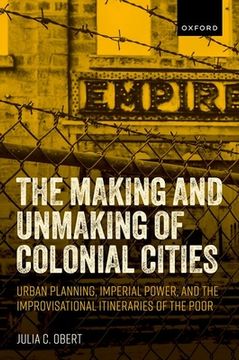Share
The Making and Unmaking of Colonial Cities: Urban Planning, Imperial Power, and the Improvisational Itineraries of the Poor (in English)
Julia C. Obert
(Author)
·
Oxford University Press, USA
· Hardcover
The Making and Unmaking of Colonial Cities: Urban Planning, Imperial Power, and the Improvisational Itineraries of the Poor (in English) - Obert, Julia C.
$ 92.29
$ 115.36
You save: $ 23.07
Choose the list to add your product or create one New List
✓ Product added successfully to the Wishlist.
Go to My WishlistsIt will be shipped from our warehouse between
Wednesday, June 12 and
Thursday, June 13.
You will receive it anywhere in United States between 1 and 3 business days after shipment.
Synopsis "The Making and Unmaking of Colonial Cities: Urban Planning, Imperial Power, and the Improvisational Itineraries of the Poor (in English)"
The Making and Unmaking of Colonial Cities is a comparative study of architectural space in four (post-)colonial capitals: Belfast, Northern Ireland; Windhoek, Namibia; Bridgetown, Barbados; and Hanoi, Vietnam. Each chapter takes up one of these cities, outlining its history of building and urban planning under colonial rule and linking that history to its contemporary shape and scope. This genealogical information is drawn from primary source documents and archival materials. The chapters then look to local literary texts to better understand the lingering impact of colonial building practices on individuals living in (post-)colonial cities today. These texts often foreground the difficulty of moving through a city that can never feel comfortably one's own; legacies of racial segregation, buildings that disregard indigenous resources, and street names that serve as constant reminders of a history of oppression, for example, can produce feelings of anxiety, even of unbelonging, for native subjects. However, the literature also highlights ways in which the subversive wanderings of particular pedestrians--taking shortcuts, trespassing in forbidden places, diverting spaces from their intended uses--can contest 'official' topography. Bodies can therefore move against the power of a repressive regime, at least to some degree, even when that power is literally set in stone. Obert argues for the significance of these small gestures of reclamation, suggesting that we must counterpose the potential flexibility of lived space to the prohibitions of the map in order to more fully understand (post-)colonial power relations.

